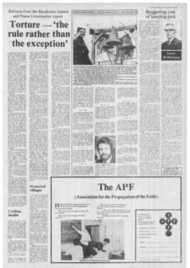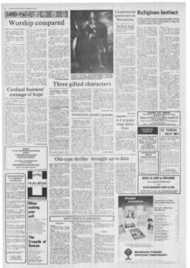Page 1, 9th September 1977
Page 1

Page 2

Report an error
Noticed an error on this page?If you've noticed an error in this article please click here to report it.
Tags
Share
Related articles
Rhodesian Bishop Accuses Forces Of Torturing Children
What Is Really Going
Bishop Backs Report
Rhodesian Peace Commission Accuses Security Forces
Deported Nun To Get Luther King Award
Rhodesia church arrests spark world protests
By Alex Cosgrave THE ARREST of four members of the Rhodesian Justice and Peace Commission in an apparent attempt by the Rhodesian Government to suppress a report accusing security forces of torturing black civilians is causing international concern in the Church.
The four, who include a Jesuit priest and a Maryknoll nun, were arrested last week after a raid on the commission's headquarters in Salisbury and now face charges under the Official Secrets Act and the Law and Order (Maintenance) Act.
A report compiled by the commission, which claims that the Rhodesian army has committed atrocities against black civilians and systematically terrorising the African population, is due to be published in London later this week.
Mr John Deary, the commission's chairman, Fr Dieter Scholz, SI, vicechairman, and Brother Arthur Dupuis, the organising secretary, have been released on bail pending trial at the end of the month, but Sr Janice McLaughlin, the commission's Press secretary, is still in detention.
In a telephone interview this week Mr Deary said that one of the seven charges brought against him and other commission members had been dropped and that their lawyer would soon be meeting the Government Prosecutor to discuss the remaining charges.
The commission's report, which is to be published by the Catholic In stitute for International Relations, claims: "Reports of tortures at the hands of government security forces continue to be the exception rather than the rule."
It documents a series of alleged atrocities by the Rhodesian army including beating, deliberate burning with hot liquid, and electric shock torture of African civilians.
Extracts from the Commission's report, page 3.
Civilians are now bearing the brunt of the war according to the report, which says that the high civilian death toll makes clear the contradictions in the government's anti-insurgency policy and highlights the double standards operating.
The report challenges the official versions of a number of incidents involving civilian deaths, and questions how those reported killed as "terrorist recruits" can be identified as such.
It further claims that the Rhodesian army often avoids direct confrontations with the guerrillas, waiting until the nationalist forces have left the area before moving in to intimidati: and torture the local population.
In a detailed analysis of the propaganda war being waged by the Rhodesian government the report illustrates the contradictions of government policy, which on the one hand seeks to assuage white fears and on the other to terrorise the black population in an attempt to isolate the guerrillas.
Leaflets containing pictures of the mutilated corpses of guerrillas and threats to the black population that they will be killed by the security forces if they co-operate with the guerrillas are widely distributed, according to the report.
In contrast, anyone writing, publishing or distributing anything "likely to cause alarm or despondency" (a crime in Rhodesia) can be imprisoned for six months.
The report concludes that while the government does not hesitate to alarm black people and make them despondent by threatening to kill them, "anyone else who writes anything to which thegovernment objects can be quickly silenced by a jail sentence and a fine."
Continued on page 2
Rhodesia arrests spark international protests
Continued from page 1 Ironically, the arrested members of the commission may now themselves face charges of "creating alarm and despondency" by attempting to publish their report.
The report is particularly critical of international Press coverage of the conflict. The government has imposed severe restrictions on journalists, few of whom are allowed to enter operational areas.
Reporters have to rely on government statements, have little opportunity for balanced background research and must submit their articles for censorship.
The Justice and Peace Commission has itself been subject to censorship, as have a number of Church newspapers. Its two previous reports, "Man in the Middle," and "Civil War in Rhodesia," which also document alleged army brutality, have never been published in Rhodesia.
-"` A collection of Press cuttings showing international reaction to "Civil War in Rhodesia" was harmed by the government under the Emergency Powers Act.
As a result of reporting restrictions the report concludes: "The image of the war presented in the British media is that of a beleagurred white minority who bear the brunt of the hardship and arc the real victims," In contrast, the report states: "If the war has seriously disrupted white Rhodesian society its impact on African life has been disastrous."
The arrests, and the attempt to suppress the commission's report are seen by many to mark a new phase in the Rhodesian government's attitude to the Church, and to constitute a direct attack on the Institutional Church.
This is the first time that the regime has moved against an official Church body. In the past it has concentrated on individual churchmen such as Bishop Lamont of Umtali, who
was deported from Rhodesia earlier this year.
The Holy See has asked Archbishop Patrick Chakaipa of Salisbury to provide full details of the arrests and the Pontifical Justice and Peace Commission based in Rome is keeping Pope Paul fully informed of the situation as it develops, The Holy See is not contemplating a protest until all the facts are available.
Fr Donald Campion, a spokesman for the Jesuit Order said they were extremely concerned about the arrests and that Fr Pedro Arrupe the Jesuit Superior General was following the events closely. The Jesuits have also asked for further information from Fr Henry Wardale and Fr Horst Ulbricht the superiors of two Jesuit districts in Rhodesia.
Bishop Mahon, President of the English Justice and Peace Commission has sent a telegram to Mr Ian Smith protesting at the arrests and in particular the continuing detention of Sr Janice.
The English Commission has also sent a telegram of support to its counterpart in Rhodesia and has been in touch with the Foreign Office. A spokesman for the Foreign Office said this week "We deplore the practice of the Smith regime in bringing charges against any of its opponents who cause them embarrassment or difficulties of this nature."
Messages of support for the commission and the Church in Rhodesia have come from Justice and Peace Commissions and development agencies throughout the world.
Bishop Eamonn Casey, chairman of Trocaire, the Irish development agency, has sent a telegram of support, as have the British Council of Churches the German Justice and Peace Commission.
blog comments powered by Disqus









